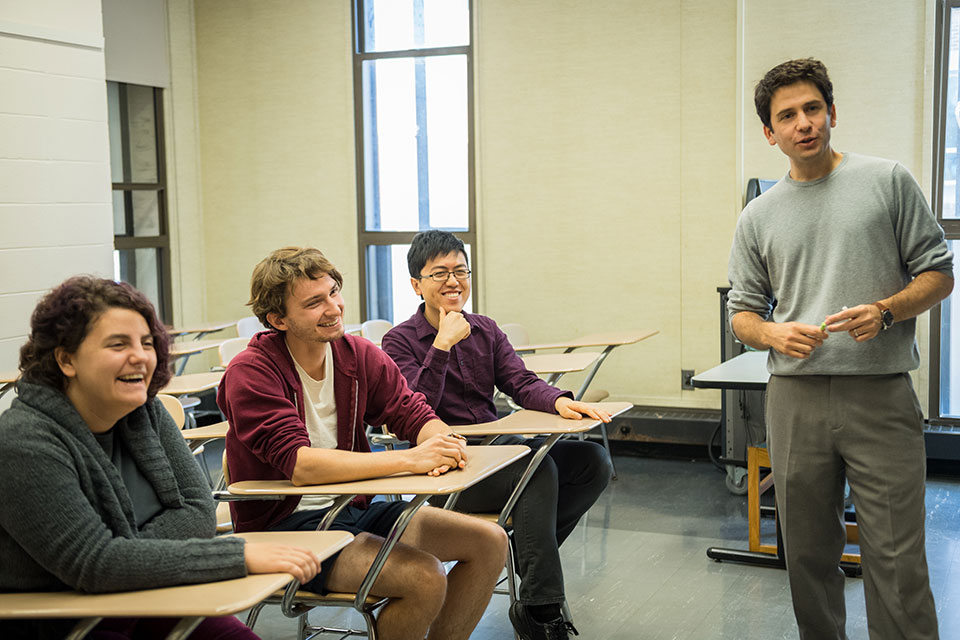Doctorate in Mathematics (PhD)
Our PhD program is small and selective and leads to a doctorate degree in mathematics. We recruit outstanding students from around the world and train them to be effective teachers and cutting-edge researchers. You will find our strengths in algebra, analysis, topology, number theory, combinatorics, and applied mathematics.
Why Brandeis?
The math department combines the informality and flexibility of a small department with the intellectual vigor of a faculty whose research accomplishments have placed it among the top departments in the country. The result is an active dialogue among all members of the department and a general air of living, creative mathematics. Our coursework gives you a broad foundation in modern mathematics.
An essential part of the PhD program consists of seminars on a variety of topics of current interest in which mathematicians from greater Boston often participate. Just beyond Brandeis, you'll find an extended mathematical community of great diversity and depth. In addition to attending lectures, seminars and colloquia, you'll have many opportunities to connect with mathematicians at Boston College, Boston University, Harvard, MIT and Northeastern, to name a few.
Careers and Alumni
Brandeis PhDs in mathematics follow in the footsteps of eminent scholars. Our alumni include:
- Victor J. Katz, Brandeis PhD '68 received the 2023 Yueh-Gin Gung and Dr. Charles Y. Hu Award for Distinguished Service to Mathematics, the most prestigious award for service offered by the Mathematical Association of America.
- Anish Ghosh PhD '06 has received the 2021 Shanti Swarup Bhatnagar Prize in Mathematical Sciences, India's highest science award. In an interview with GSAS, Ghosh describes his work as a "branch of mathematics called ergodic theory which can be loosely described as the mathematically rigorous study of chaotic systems...Somewhat surprisingly, it turns out that ergodic theory is closely connected to an ancient branch of mathematics called number theory. My work explores the connections between these two subjects." Ghosh describes his experience at Brandeis as "wonderful" and says that his "PhD supervisor Dmitry Kleinbock was my mentor and provided all the support and guidance that I needed," while citing other influential faculty mentors in the department as well. Ghosh is currently a faculty member at the Tata Institute of Fundamental Research (TIFR), Mumbai where he specializes in Ergodic Theory and Number Theory.
- Douglas Ravenel, Brandeis Math PhD '72, was named a co-winner of the 2022 AMS Oswald Veblen Prize in Geometry for a paper that he co-authored with Michael Hill and Michael Hopkins,"On the nonexistence of elements of Kervaire invariant one." In an interview with AMS, Ravenel states "Solving the Kervaire invariant problem was the biggest surprise of my mathematical life....The discovery that Hill, Hopkins, and I made 40 years later felt like hiking in the Alps only to find a shortcut up Mount Everest." The Oswald Veblen Prize is awarded every 3 years to honor the authors of a notable research work in geometry or topology. Ravenel's PhD advisor at Brandeis was Mathematics Professor Emeritus Edgar Brown. Ravenel is a currently a Professor of Mathematics at the University of Rochester.
- Karen Keskulla Uhlenbeck MA'66, PhD'68 is the distinguished recipient of the Abel Prize in Mathematics (2019), MacArthur Prize Fellowship (1983), Noether Lecture (1988), National Medal of Science for Mathematics and Computer Science (2000), the Guggenheim Fellowship for Natural Sciences, US & Canada (2001), and the American Mathematical Society's Leroy P Steele Prize (2007).
- János Kollár PhD’84, a co-recipient of the 2017 Shaw Prize in Mathematical Sciences, which honors breakthroughs by researchers in the fields of mathematics, astronomy, and life science and medicine.
- Leslie Lamport MA’63, PhD’72, H’17 received the 2013 A.M. Turing Award from the Association for Computing Machinery.

“I would advise (students) to have an open mind and study as many different mathematical topics as they can. Also, mathematics is very difficult and constant failure is a part of every mathematician's life, so one has to accept it and plod on. Occasionally, one is rewarded with an insight into some beautiful mathematics and that makes it all worthwhile.”
Anish Ghosh PhD '06